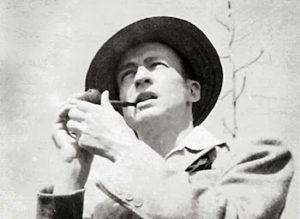
William Stetson Kennedy
*On this date, in 1916, William S. Kennedy was born. He was a white-American author, folklorist, and human rights activist.
William Stetson Kennedy, commonly known as Stetson Kennedy, was born in Jacksonville, Florida, to Willye Stetson and George Wallace Kennedy. A descendant of signers of the Declaration of Independence, Kennedy came from a wealthy, aristocratic Southern family with relatives such as John Batterson Stetson, founder of the Stetson hat empire and namesake of Stetson University.
At a young age, Kennedy began collecting Florida folklore material and wrote poetry about Florida's nature. His views on race relations in the South were largely influenced by his family's Black maid, known only as "Flo," whom Kennedy considered "almost like a mother." He recalled that during his childhood in the 1920s, local Klan members beat and raped Flo for "sassing white folks" after she questioned a white bus driver who had given her incorrect change. Recalling this incident later in life, Kennedy said, "At a very tender age, I became aware that grownups were lying about a whole lot more than Santa Claus," referring to the Klan's claims of being Christian patriots.
Kennedy attended Jacksonville public schools and graduated from Robert E. Lee High School during the Great Depression. In 1935, he enrolled in the University of Florida, Gainesville (UF), leaving in 1937 without receiving a degree. He also studied at the New School for Social Research in New York and at the Sorbonne in Paris, France. Kennedy has been called "one of the pioneer folklore collectors during the first half of the 20th century." In 1937, he left the University of Florida to join the Federal Writers' Project, the federally funded Works Progress Administration (WPA) initiative created under the New Deal to fund and support American writers during the Great Depression.
As part of the Federal Writers' Project, the Library of Congress hired archivists to document the diversity of American culture by recording regional folksongs (e.g., children's songs, dance, and gospel music) and oral histories in many languages and dialects. Kennedy collected Florida folklore, traveling throughout the state for five years alongside notable figures such as writer Zora Neale Hurston and folklorist Alan Lomax. Kennedy had a large role in editing several volumes for the Federal Writers' Project, including The WPA Guide to Florida and A Guide to Key West of the WPA's American Guide Series and The Florida Negro. Kennedy's first book, Palmetto Country (1942), was based on unused material collected during Kennedy's time with the Federal Writers' Project.
When it was published, Alan Lomax of the Library of Congress said, "I very much doubt that a better book about Florida folklife will ever be written." Also, in 1942, Kennedy began working for the CIO, a federation of labor unions for industrial workers. As an editorial director for the CIO's political action committee (PAC) in Atlanta, he wrote a series of monographs advocating against racist policies such as the poll tax, white primaries, and other restrictions that were routinely used throughout the South to disenfranchise non-whites, primarily African Americans, and poor people from being able to exercise their right to vote. Kennedy could not enlist in the military for World War II because of a bad back, so he channeled his patriotism towards combatting racial injustices in the Jim Crow South.
He is best known for trivializing their rituals infiltrating the Georgia Ku Klux Klan, and exposing their secrets on the popular children's radio program The Adventures of Superman. He also targeted the Columbians, an Atlanta-based neo-Nazi organization. Kennedy said, "There were an awful lot of evils abroad in the world at the time, as there still are, but I couldn't help but feel that racism was perhaps the most evil". Working with the Georgia Bureau of Investigation, Kennedy joined multiple Klan-affiliated organizations under the pseudonym John Perkins to gain evidence that could be used to prosecute its members. He obtained information about the Klan's "Invisible Empire" through his participation and also through a high-ranking informant. As soon as he became aware of new details, he shared the Klan's secrets with police, prosecutors, journalists, and human rights organizations.
Kennedy claimed that in 1946, he provided information, including secret codewords and details of Klan rituals, to the writers of the Superman radio program, intending to strip away the Klan's mystique. 1947 after a year of working undercover, he agreed to testify in a trial against the leaders of the Columbians, Homer Loomis and Emory Burke, who was found guilty. Superman took on the Klan in a series of 16 episodes. He claimed that the trivialization of the Klan's rituals and codewords likely hurt Klan recruiting and membership, leading Stephen J. Dubner and Steven Levitt to dub Kennedy "the greatest single contributor to the weakening of the Ku Klux Klan" in their 2005 book Freakonomics. However, in 2006, Dubner and Levitt cast doubt on the statements of Kennedy, stating, "The story of Stetson Kennedy was one long series of anecdotes which, no matter how many times they were cited over the decades, were nearly all generated by the same self-interested source."
Kennedy was married five times; His first marriage was in 1936 to Edith Ogden-Aguilar, a Cuban émigré he met in Key West, Florida while doing fieldwork for his writing. In 1942, he had a son, Loren Stetson Kennedy, his only child. After fleeing Budapest with his Hungarian wife during the Hungarian Revolution of 1956, Kennedy was held in detention in Paris for over a year after the U.S. government confiscated his passport due to McCarthyism. In 2006, at 90 years old, Kennedy married writer and bookstore owner Sandra Parks, a former St. Augustine, Florida, city commissioner. They remained married for the rest of his life.
Kennedy died on August 27, 2011, at Baptist Medical Center South in Jacksonville, Florida, where he had been in palliative care for several days. Kennedy is remembered for the writing of folklore collectors during the first half of the 20th century; Kennedy wrote or co-wrote ten books and infiltrated the Ku Klux Klan in the 1940s, exposing its secrets to authorities and the outside world. His actions led to the 1947 revocation by the state of Georgia of the Klan's national corporate charter.
